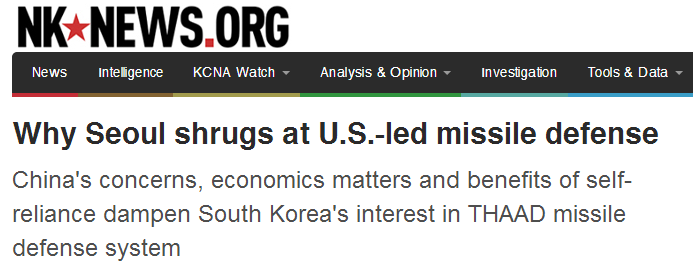My comments for NK News‘s recent analysis, Why Seoul shrugs at U.S.-led missile defense:
Military analyst Subin Kim said THAAD would mean a leap in defense capabilities.
“With the implementation of the THAAD, South Korea would be able to shoot down ballistic missiles up to 150 kilometers in altitude,” he said. As the South Korean Air Force’s anti-ballistic missile technology, under the current MIM-104 Patriot system it has operated since 2010, is limited to an altitude of around 20 kilometers, the new capabilities “would be quite a stretch,” Kim said.
“It would give South Korea more chances to intercept North Korean ballistic missiles —THAAD engaging one in the upper tier and Patriot engaging again in the lower tier if (THAAD) failed. Whether ballistic missiles are the North Korea’s direst threat to South Korea is still debatable, but this (would be) quite an improvement indeed.”
…putting aside whether the ballistic missile threat from the North is the most urgent one or not.
(…)
Asked why South Korea would object to this type of boost to its security capabilities, Kim cited “concerns about China’s reaction and military’s priority of procurement” – meaning the preferred order in which the ROK military would choose to purchase the system, as there are certain other priorities coming first.
I’d like to see this kind of things with a tinted glass of organization theory. If ever South Korea happens to introduce the THAAD system, it will be upon control of the Air Force, which has Air Defense Artillery Command. I don’t think the Army generals, who have most of the stars and the control over procurement decisions in the South Korean military, would be excited over this.
Even Air Force generals who are mostly, if not all, pilots wouldn’t welcome this since more money for air defense means less for aviation. Air defense artillery, once belonged to the Army but reorganized into Air Force in 1991, is something like a remote island, I can tell you as a former ADA officer.
However, he also said that, even South Korea does take into account China’s wishes on this issue, it won’t necessarily have to on future security issues due to the unique nature of this issue, in which South Korea could potentially help the U.S. nullify a major offensive capability of the North’s – and the PRC’s.
“Ballistic missile defense, while seems like a purely defensive system, in effect offsets neighboring countries’ long-distance nuclear delivery capacity,” he said. “This is why Russia is so sensitive against the U.S.’s deployment of BMD systems in Europe.
“China’s concern might be exaggerated but isn’t groundless at all. And this doesn’t mean that Seoul has to consult other security issues with Beijing later on. It’s just this one that affects China directly.”
It’s still the U.S. (and will be for quite a while) that can hugely influence South Korean defense strategy, not China. Simple as that.

Leave a Reply